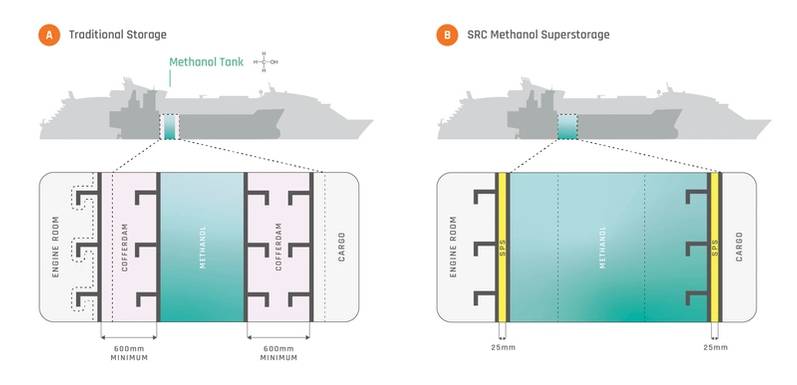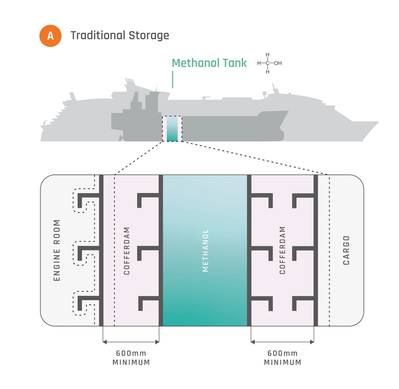Exploring 'Future Fuels' - Methanol’s Superstorage Solution
Technical inquiries to SRC Group ramped up after it received Approval in Principle (AIP) for a concept which ‘reinvented methanol fuel storage’ on board ships. Delivering the answers has seen technical talk converting into project discussions
‘Green’ methanol has the ability to one day run vessels almost emission-free, and commercial shipping increasingly investigates. Derived today principally from natural gas, methanol is nonetheless available, relatively easy to handle and predictable. Lower carbon today, and potentially zero carbon tomorrow, methanol offers an alternative to HFO, and a pathway towards decarbonization targets.
A chief challenge to incorporating methanol as a maritime fuel traditionally has been its space inefficiency, as ton-for-ton, it takes 2.4 times more methanol to generate the equivalent energy as HFO.
Conventionally, tanks storing low flashpoint fuels on board ship feature cofferdams of at least 600mm across to separate internal and external walls. Included as a safety precaution, the gap also restricts capacity.
Imaginative design can help find unused spaces for extra storage on board a newbuild ship, but opportunities are more limited on existing vessels. Where retrofitting a dual fuel engine to run on methanol is feasible, the fuel storage issue may restrict a ship to short voyages or demand more frequent bunkering – both of which impact on ROI.
In October 2023 Lloyd’s Register granted Approval in Principle (AiP) for SRC Group’s ‘Methanol Superstorage,’ a retrofitted tank storage solution that increases volume by 85%, according to SRC, but can be installed with only a minimal impact on the general arrangement.
 Image courtesy SRC
Image courtesy SRC
Closing the Gap
Methanol Superstorage solution dispenses with the cofferdam altogether and instead installs tank walls formed by sandwich panel system (SPS) technology, consisting of a continuous polymer core that has been injected between two steel surfaces.
Approved for permanent repairs by all major IACS class societies, SPS technology has been used in maritime and offshore applications for over two decades - including for corrosion repairs in ship structures. Class approvals secured have involved laboratory testing of the polymer core material for chemical resistance - including for methanol. Engineering, Procurement, Construction and Installation (EPCI) service provider SRC has experience of complex refits across over 5,000 projects worldwide, including extensive experience of the patent protected SPS technology process.
For the Methanol Superstorage fuel tank, a 25mm thick steel-polymer-steel barrier provides protection against fire or leakage that is equivalent to a conventional tank, according to SRC. The injected polymer also creates oxygen-free conditions behind the steel plates to prevent corrosion.
The SPS sandwich panel system can be used in lieu of cofferdams on all tank boundaries including those facing to shell plating.
“We always knew how significant Methanol Superstorage would be, because existing ships need to play a full role in energy transition if GHG emission targets are going to be met and storage capacity is a key challenge,” said Hannes Lilp, CEO, SRC Group. “We are already in detailed discussions with a well-known ferry operator, while we’ve been approached by cargo ship operators, offshore support vessel owners, tug companies, shipyards in Europe and Asia, and by the marine engine suppliers. One area that has surprised us has been the high level of interest from the super yacht sector.”
Less surprising has been the flow of inquiries from cruise ship owners, many of which have already been studying the feasibility of retrofitting ships for methanol as a marine fuel.
“These are new and confidential discussions, but what I can say is that live projects are under review to accommodate consideration of Methanol Superstorage, while one project that looked dead is being revived,” said Lilp. The in-flow of technical questions from all corners of the maritime industry has been “almost overwhelming.”
 “We always knew how significant Methanol Superstorage would be, because existing ships need to play a full role in energy transition if GHG emission targets are going to be met and storage capacity is a key challenge,” said Hannes Lilp, CEO, SRC Group. Image courtesy SRC Group
“We always knew how significant Methanol Superstorage would be, because existing ships need to play a full role in energy transition if GHG emission targets are going to be met and storage capacity is a key challenge,” said Hannes Lilp, CEO, SRC Group. Image courtesy SRC Group
The Path to Classification
Securing AiP provides a technology developer with a statement from Class confirming that there are no major obstacles to future certification or classification. Discussions covering approvals from other classification societies are ongoing, said Lilp, although he acknowledges that journey from AiP to full class approval is substantive. In an area where the regulations underlying fuel storage are evolving, additional scrutiny can be expected.
“Due to the regulatory status of low flash point fuels all methanol fuelled ships need to go through a Risk Based Certification process that includes full risk assessment for the whole methanol fuel system from bunkering station to the engines,” said Alex Vainokivi, Innovation Manager, SRC Group. “AiP is part of the risk assessment. Any final approval for a methanol fuelled ship comes from the Flag State Administration.”
Nevertheless, key SPS technology characteristics are not in dispute. “For example, under fire testing, and when the core thickness for SPS structure is more than 25mm it has satisfied the fire safety objectives and the functional requirements of SOLAS A-60 regulations without the need to install thermal insulation,” says Vainokivi.
“We will establish whether inerting and venting are needed on a case-by-case basis – and the same for fire and leakage detection – but the requirements relating to cofferdams can be dispensed with. From that perspective, the solution provides equivalent ‘triple barrier protection’ to prescriptive requirements for cofferdams adjacent to all space categories – including accommodation.”
As of September 2023, methanol had been specified for 216 newbuilds, according to figures from DNV, and Clarksons estimates that 1,200 ships could be powered by methanol by 2030.
Lilp says the most frequently asked question SRC has been fielding concerns whether Methanol Superstorage is as appropriate for newbuildings as it is for retrofits. “The answer is an emphatic yes: fuel storage tanks can be constructed using the SPS sandwich panel system in lieu of cofferdams on both new build and refit projects. We seek to open more direct channels of communication for questions from major shipbuilders and designers worldwide.”







